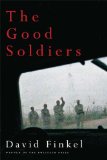Write your own review!
Sheldon Kelly
"The Good Soldiers," by David Finkel
"The Good Soldiers" is a true narrative of a 15-month tour of duty of one US Army infantry battalion while at war in Iraq. It's well-crafted sentences and fluid transitions make it easy to read, to follow, to understand. Perhaps a bit too easy, for readers can find themselves suddenly stunned, maybe breathless, even tearful. And still the tension builds; finally there is an unexpected human crescendo. By now one may ask: Why haven’t I been told such things before?
There is no other book about the Iraq War that has given us such a full-color spectrum of soldiers living (and fighting, dying and being horribly wounded) day to day, month to month during their entire tour of duty. All the while assigned to an area that the battalion’s commander, West Point grad Lieutenant Colonel Ralph Kauzlarich, came to consider an expletive-deleted version of an outhouse without the house.
In that regard, "The Good Soldiers" is not for the timid, or those bothered by soldiers’ combat zone language. As the action grows, as emotions tighten with resolve and hurt, the dialogue grows evermore raw. You watch men evolve under fire, and it’s simultaneously poignant and frightening, this blooding of our hometown warriors.
The narrative opens without throat-clearing, and per the agreement between Pulitzer Prize winning Washington Post reporter David Finkel and Lt. Col. Kauzlarich, there isn’t a speck of partisan rhetoric to be found on the rightness or wrongness of the war. There is a straightforward section that describes soldiers watching base satellite tv as General David Petraeus, commander of all US forces in Iraq, testifies before Congress. They also watch screaming cable pundits and wish they’d come to their remote base for “the full pucker.”
The only other hints of political imperative are the italicized headings placed before each chapter. These are chronological excerpts from President Bush’s speeches addressing what became known as The Surge. The first, January 2007, announces his decision to increase US troop levels by five combat brigades. Most of them, including Kauzlarich’s “2-16" - Second Battalion, 16th Infantry Regiment, 4th Infantry Brigade Combat Team, First Infantry Division - would be deployed to the most dangerous zones around the Baghdad. The last chapter’s italicized heading is from President Bush’s speech to the troops on April, 2008. ‘You’’ll come home with pride in your success and the gratitude of a whole nation. God bless you.’
Bookended between these excerpts were the lives of 2-16's young soldiers (average age, 19; youngest, 17), and their leaders.
This is their story of their tour of duty, which on the very day of their first deadly attack, was extended from a promised 12 months to 15. An irony, yes, but war’s ironies soon become so commonplace they’re almost expected. Even the unit’s dust-covered base in Rustamiyah, on the eastern edge of Baghdad, home to 350,000, seems an irony: The 2-16 had been briefed that their biggest threat would be IEDs (improvised explosive devices), and that they were often hidden in piles of trash. Yet, when they arrived they saw a ‘vast landscape’ of trash. The air reeked of it and raw sewage, burning their throats. ‘We ain’t ever gonna be able to find an IED in all this shit,’ a soldier says quietly.
Of course, they do find them, even as they themselves are found, even as a deadlier type of bomb comes into play: the EFP, explosively formed penetrator, which can send its shrapnel slicing horrifically through Humvees and the men inside. Meanwhile, Kazalarich and his executive officer, Major Brent Cummings, attempt to implement General Petraeus’ new strategy of Counter-Insurgency, engaging Iraqis in civil affairs, starting with futile attempts to rebuild the local sewage treatment plant. But the war is relentless. Attacks by EFPs, IEDs, RPGs, snipers, rockets, mortars are followed by a solemn stream of memorial services for the fallen.
It is from close inside this crucible of war that we see the bravery of the 2-16, (even that of two Iraqi interpreters, including a young woman named Rachel, who tries to save a dying soldier during an ambush). We hear the infantrymen’s macabre humor, learn their frontline superstitions, discover their almost clinical methods of possibly saving one foot or hand if and when they’re hit while in an Humvee. We also learn that the front right seat is deadliest - and that one top-rated gung-ho Sergeant, on his third combat tour, always insisted on sitting there when leading his men.
“ ... no one knew. Here was all this stuff, pounding heart, panicked breathing ... electric eyes, and no one regarded him as anything but the great soldier he’d always been, the one who never complained, who hoisted bleeding soldiers onto his back, who’d suddenly begun insisting on being in the right front seat of the lead Humvee of every mission, not because he wanted to be dead, but because that’s what selfless leaders do.
“He was the great Sergeant ... who one day walked to the aid station and went through the door marked COMBAT STRESS ...” Finkel writes, “He was injured. He was dead. He was done.” It had taken one-thousand days.
Finkel, 54, father of two daughters, husband to a former military brat, spent eight months in Rustamiyah, going in and out of ‘‘the wire’’ with the 2-16; another seven in research and following its wounded soldiers to Army Hospitals. Because he wanted this to be truly a ‘soldiers book’ he chose to omit himself from the narrative. Thus, no first-person accounts of his own fear during combat or what he felt watching young men suffer. No, like WWII's Ernie Pyle, he merely hangs on to his notebook, transcribes the events as they unfold and lets those fighting and suffering tell us themselves.
#
(An edited version of this review was published December 13, 2009, in the Virginia Pilot's Sunday editions.)




